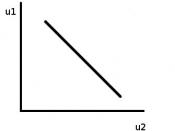1
The concept of sustainable development is an attempt to balance two moral demands placed on the environment. The first demand is for development, including economic development or growth. It arises mainly from the interests of people who live in developing countries. Their present poverty gives them a low quality of life and calls urgently for steps to improve their quality of life. The second demand is for sustainability, for ensuring that we do not risk the future in the sake of gains in the present. This arises from the interests of people in the future who will need access to a reasonable quality of life, non-renewable resources, unspoiled wilderness, and a healthy biosphere. These two moral demands do conflict. In fact, economic growth is the prime source of threats to the natural environment.
We have a rough sense of what a good quality of life for humans consists of.
Also, we can make some rough judgments about when a person's quality of life has increased or decreased. Utilitarianism about future generations says that people should weigh these increases impartially with respect to times. And, in particular, should not prefer a smaller increase in the present well-being to larger increases in the future. We should try to maximize the sum of increases in well-being across times counting future lives equally against those in the present. Our moral goal should always be to produce the greatest total of such gains, no matter by whom they are enjoyed.
Utilitarianism has been extensively discussed by philosophers, and many objections have been raised against it. Two objections are especially relevant
2
here. First, utilitarianism is an extremely, even excessively demanding moral view for most humans. If we have a duty always to bring about the best outcome, than any time we can increase the...


